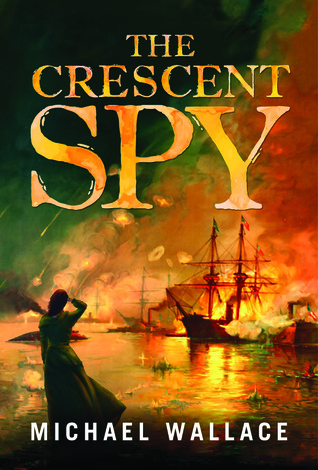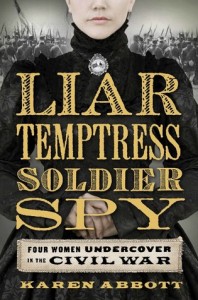 The Crescent Spy by Michael Wallace
The Crescent Spy by Michael Wallace Formats available: hardcover, paperback, ebook, audiobook
Pages: 325
Published by Lake Union Publishing on November 10th 2015
Purchasing Info: Author's Website, Publisher's Website, Amazon, Barnes & Noble, Bookshop.org
Goodreads
Writing under a man’s name, Josephine Breaux is the finest reporter at Washington’s Morning Clarion. Using her wit and charm, she never fails to get the scoop on the latest Union and Confederate activities. But when a rival paper reveals her true identity, accusations of treason fly. Despite her claims of loyalty to the Union, she is arrested as a spy and traitor.
To Josephine’s surprise, she’s whisked away to the White House, where she learns that President Lincoln himself wishes to use her cunning and skill for a secret mission in New Orleans that could hasten the end of the war. For Josephine, though, this mission threatens to open old wounds and expose dangerous secrets. In the middle of the most violent conflict the country has ever seen, can one woman overcome the treacherous secrets of her past in order to secure her nation’s future?
My Review:
 The Crescent Spy goes really, really well with both The Spymistress by Jennifer Chiaverini (reviewed here) and Liar, Temptress, Soldier, Spy by Karen Abbott (reviewed here). Both the Chiaverini and Abbott books tell the stories of women who were spies for one side or the other in the war variously known as the “War of the Rebellion” if you were a Union partisan and the “War of Northern Aggression” if you supported the Rebel states.
The Crescent Spy goes really, really well with both The Spymistress by Jennifer Chiaverini (reviewed here) and Liar, Temptress, Soldier, Spy by Karen Abbott (reviewed here). Both the Chiaverini and Abbott books tell the stories of women who were spies for one side or the other in the war variously known as the “War of the Rebellion” if you were a Union partisan and the “War of Northern Aggression” if you supported the Rebel states.
While Liar, Temptress is intended as a more factual and less fictional account, both it and the fictionalized Spymistress feature stories of real women who were known as spies. The Crescent Spy uses its invented protagonist, Josephine Breaux, to show another aspect of the role of spies in the war, and the way that covert intelligence could affect actual policy. And it also gives us an intimate view of the battle for the port of New Orleans, as well as showing just how effective newspaper reporters could be as spies.
We meet Josephine Breaux as she is fleeing the First Battle of Manassas, or Bull Run, again depending on which side you are on. Josephine is not alone – a surprising number of civilians and society people traveled down from Washington DC to watch the Union kick the Rebels’ tails. But it didn’t happen that way. Instead, the Union Army, along with the spectating civilians, fled in disarray from the spirited defense of the Confederate Army. Josephine, writing as she travels, details that it wasn’t so much that the Confederates won, as that the Union Army lost its will to fight in the confusion. The fog of war is a very real thing, especially when you feel all alone in the middle of it.
After she returns to DC, Josephine finds herself exposed by a rival newspaper. The real exposure is that she is the writer behind the male war correspondent Joseph Breaux. That would be survivable, but a story has been planted that she is a Rebel spy. She is done in DC.
Instead of setting out for New York City as she planned, she finds herself sitting in the White House, listening to President Abraham Lincoln explain that she has been chosen by the Pinkertons to travel to her former hometown of New Orleans to cover the war and spy for the Union. While angered that her downfall in DC was engineered by the Pinkertons, Josephine is flattered by the President’s attention to her intelligence and writing skill, and as an ardent Union supporter, finds herself accepting the President’s offer of clandestine employment.
This is where the fun really begins, as Josephine has to make her way from DC, through the Union blockade, to the Confederate port of New Orleans. In NOLA she uses her newfound notoriety as a Rebel spy to get herself a job on a New Orleans newspaper and makes herself both a war correspondent and the recipient of all the military-preparedness related gossip she can lay her hands on.
Josephine plays a major role in the Union’s relatively early capture of the South’s biggest port. The war began in 1861, and New Orleans was occupied by the Union Army in 1862. While the South mourned its loss, the early capture of New Orleans saved it from destruction by the Union Army such as was visited upon Atlanta and other cities during Sherman’s March.
But during that tumultuous year, we follow Josephine as she learns to be an effective spy while continuing to ply her trade as a journalist. That she is sending secret reports on Confederate readiness (or lack thereof) to the Union Command does not prevent her from reporting the war that she witness to the people in the city that are eagerly awaiting news and reassurance. Even when her news is true and her reassurance is false.
She is constantly aware that she could be betrayed at any moment. Her own past as a riverboat dancer’s daughter comes back to haunt her, and old friends resurface as enemies, willing to sell Josephine out for a chance at enough money to escape the war. Her old life is a much greater threat to her future than anything she does as a spy, including blowing up a powder magazine.
As a later Southern writer will say, “The past isn’t over. It isn’t even past.” Josephine discovers that her past isn’t done with her yet. Both it and her inability to deal with it nearly does her in, but she soldiers on.
Escape Rating B: This is a good solid story of a woman who is doing things that women were not supposed to do in her time and place. But the war provides the excuse and the impetus for Josephine to break out of any role that she is supposed to be in.
She is a likeable character without being too goody-two-shoes or too aggressively strident, although she occasionally comes close to the latter. If she were a man, no one would think twice about her extreme self-confidence or her desire for glory and validation of her prodigious talent. As a woman, she often finds herself in the position of needing to equivocate in order to get the military brass to see that she, not merely female but barely 21, actually does know more about military tactics than most of the idiots that are currently leading the Union Army. And while she is good enough at playacting in order to pursue a story, she has no capacity for hiding her light under a bushel basket when she is giving her own opinions. Even when those opinions sound a lot like giving orders to generals.
Josephine always thinks she knows best, and only lets her fear out when she’s alone.
The most difficult part of the story is the way that Josephine deals with her past. It’s not that she’s the daughter of a riverboat dancer and occasional prostitute, or even that she feels ashamed of what she came from. But she is still running from her ghosts, including the man who might be her father. Her past nearly overruns her present, and the secrets she keeps about who she is and how she got her start have a real chance at getting both her and the Pinkerton agent she works with killed. Even by the story’s end, while she has finally revealed the information to her partner, she still hasn’t dealt with the fallout emotionally. She still has some growing up to do. Which makes her a very interesting character to follow.
~~~~~~ GIVEAWAY ~~~~~~
I am giving away a copy of The Crescent Spy to one lucky U.S. or Canadian commenter:




















I just like the mystery and the suspense of a spy story. Will they get caught? What will they find out? So intriguing to me.
I like reading about how they get away with it! Thanks for sharing 🙂
Spy stories are intriguing, and delve into the minds of the individuals and their escapades which are enthralling.
I like spy stories which are historically accurate.
I love the suspense and thrill of the chase!
The thing I like best is the same as the thing I like least: the tension. When you’re on the edge of your seat wondering what will happen next is both great fun and pure torture.
Thanks for the giveaway opportunity.
I think I derive most of my enjoyment of spy stories from the action.
the suspense
Josephine sounds like a character I would enjoy getting to know.
Thanks for being a part of the tour!
I like to try to descover things while I’m reading